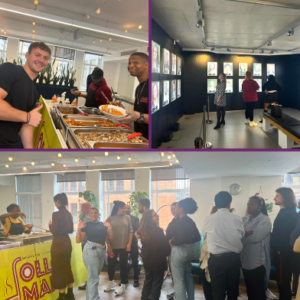Black History Month, celebrated in the month of October, was originally created in the United States to focus attention on the historic and cultural contributions made by African Americans. It’s now widely recognised around the world, and after organising our own range of activities, experiences, and teachings at La Fosse, we wanted to share our takeaways from an important month.
Through a series of internal communication, we:
- Learnt about the life of Jesse Moorland, Founder of the Association for the Study of Negro Life and History, an organisation dedicated to researching and promoting achievements by Black Americans and other people of African descent.
- Listened to the powerful lyrics of Nina Simone, a famous singer who created urgent emotional intensity by singing songs of love, protest, and Black Empowerment.
- Found out about Althea McNish, one of the first designers of African-Caribbean descent to achieve international recognition. Her designs injected much-needed colour and life into the post-war fashion and textiles industry from the 1950s onwards.
- Shone a spotlight on the Kai Collective, a London-based Black-owned fashion brand founded by Fisayo Longe. Her ‘Gaia dress’ was celebrated by the fashion elite, and Fisayo has featured in numerous publications, including Forbes Magazine.
- Featured Zambian-born William JM Chilila, who, after making it to the semi-finals of MasterChef, went on to become the Head Chef of London West African fine-dining restaurant Akoko.
We were lucky enough to take a trip to the Black Cultural Archives, a Brixton institution that collects, preserves, and celebrates the histories of people of African and Caribbean descent in the UK. After the visit, Stephanie Pempestios, Marketing Executive at La Fosse Associates, had this to say about her experience:
“It was great to discover so much Black history right on your doorstep, and celebrate Black art, literature, and film all in one place through their library, screening rooms, and memorabilia. The district of Lambeth, (which includes Brixton) was where many Caribbean Americans and West Indian Americans moved to in order to find work, which led to the early post-war settlement and development of the Black community in Brixton. So, for this reason, the area of Brixton and its surrounding areas are of great importance to Black history today, and this is represented by memorials, statues and museums dedicated to the people of the Windrush. This was a great experience to do as part of BHM and we will be sure to find and support these museums and archives who continue to educate the public on Black history.”
Another highlight was a delicious lunch prepared for the team by Jollof Mama, a West London family-run business, bringing the taste of West African food to the masses by “showcasing Nigeria’s finest dishes using traditional ingredients with a modern twist”. The size of the queue and the clean plates certainly spoke for themselves!
As we conclude celebrating Black History Month, it’s important that efforts are continued; recognising Black history shouldn’t only occur in October.Taking the opportunity to learn more about Black history throughout the year and listening to our Black colleagues, service users, friends, and family is so important and will go some way to making society a more equal and appreciative place. DE&I is an ongoing, vital project; our aim as a business is to be representative of the community we are a part of. Some of the ways we hope to achieve this are:
- Companywide DE&I training - provided by our Talent Development team.
- Ongoing recognition - through celebrating Black art, history, and literature through our clubs, trips, etc.
- Our Proud2Be Network – creating a safe and welcoming space for all to share experiences and ongoing conversations around underrepresented talent.
- Consistent interview structures and the use of psychometric tools – giving everyone an equal and consistent process to minimise bias.
- Training for all levels – giving everyone an equal opportunity to succeed.
And it’s not just about implementing internal change. There are a variety of actions we can take outside our working environment to recognise and promote Black culture, which include:
- Support Black-owned businesses – you can use the #BlackOwnedBusiness hashtag and encourage your circle of influence to do the same. Follow Black-owned businesses and share their content, so that these businesses can grow their audience and awareness of their brands.
- Read more about why it’s important to support Black-owned businesses, and some examples of those based in the UK.
- Take a look at these fantastic recipes and make your own African-inspired dinner, or try William JM Chilila’s very own chicken Yassa recipe.
- Do some research about Black history in your own community and go out and explore – find a museum, a statue, or a gallery and learn more about its significance in your local area.
“Black History Month provides a fresh reminder to take stock of where systemic racism persists and focus on how we can make a difference. It offers an opportunity to reimagine what possibilities lie ahead. We have achieved so much, but we have only just started our journey to make the changes needed to make a real difference.”
Jackie Dane – Chief People Officer at La Fosse
